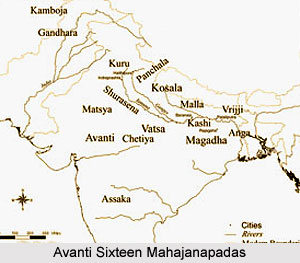 Avanti was divided into two parts and it was in the province of Malva. Ujjain and Mahishamati were the capital of Northern and Southern Avanti respectively. Its king Pradyota or Chanda Pradyota was a contemporary of Lord Buddha. He married the daughter to king Udayana. In his later life, Pradyota became a follower of Lord Buddha as well. Buddhism rose to its prominence in this kingdom and this was one of the other kingdoms which initiated Buddhism in a larger manner.
Avanti was divided into two parts and it was in the province of Malva. Ujjain and Mahishamati were the capital of Northern and Southern Avanti respectively. Its king Pradyota or Chanda Pradyota was a contemporary of Lord Buddha. He married the daughter to king Udayana. In his later life, Pradyota became a follower of Lord Buddha as well. Buddhism rose to its prominence in this kingdom and this was one of the other kingdoms which initiated Buddhism in a larger manner.
The people of Avanti or the Avantis do not emerge into importance as a ruling Kshatriya tribe of ancient India in the Vedic times. Their name is not found in the Vedic literature; but in the Mahabharata they are found to be one of the most powerful of the Kshatriya clans. Their dual monarchs, Vinda and Anuvinda, each led an aksauhini of troops to Duryodhana`s army, and thus the Avantis made up one-fifth of the entire Kuru host. The two monarchs are designated `maharatha` which is the highest title given to an epic warrior. The two Avanti princes figure very prominently in the battle, and many glorious and heroic deeds have been credited to them. They had rendered useful service to the Kaurava cause with the help of their individual prowess as well as by the large army consisting of forces of every description which they led to battle.
It has been mentioned in the Matsya Purana that the origin of the Avantis belongs to the Haihaya dynasty of which Karttaviryarjuna was the most glorious ruler, and adds that Avanti was the name borne by one of the sons of this monarch. The Indian Puranas also speak of intermarriages between the royal family of the Avantis and the ruling dynasty of the Yadus. The Linga Purana states that out of the hundred sons of Karttaviryarjuna, five, namely Sura, Surasena, Drista, Krishna and Yayudhvaja, ruled Avanti and had acquired great renown. The Visnu-Dharmottara Mahapurana and the Padmapurana speak of Avanti as one of the mahajanapadas or chief provinces of ancient India. The Skandapurana has a whole section, the Avantyakhanda, dealing with the sacred sites and places of pilgrimage in the country of the Avantis. Thus the Vishnu Purana and Agni Purana state that a Yadu princess called Rajyadhidevi was married to the king of Avanti.
History states that the produce and manners of the people of Ujjain, the capital of Avanti are like those of the country of Surastra. The population is dense and their establishments wealthy. The priests of the city studied the doctrines both of the Great and the Little Vehicle. There were several tens of Deva temples, occupied by sectaries of various kinds. The king belonged to the Brahmin caste. He was well-versed in heretical books, and did not believe in the true law.
Avanti in the early days was a famous commercial centre. It was also a great centre of science and literature. Ujjayini, the capital of Avanti was one of the seven sacred cities of the Hindus, and astronomers had reckoned their first meridian of longitude from Ujjayini.
Avanti was one of the most flourishing kingdoms of ancient India. Avanti had become an important centre of the new doctrine which is now called Buddhism, and was also the scene of elaboration of Pali, the sacred language of the Buddhists. In Avanti there were several adherents of Buddhism.
As far as the political history of Avanti is concerned it can be said that the Pradyotas were kings of Avanti and their capital was Ujjayini. In later times some of the ruling families of Avanti made their mark on Indian history. The Pararnara dynasty of Malwa, anciently known as Avanti, is especially memorable by reason of its association with many eminent names in the history of later Sanskrit literature. The dynasty was founded early in the ninth century by a chief named Upendra or Krishnaraja.






































